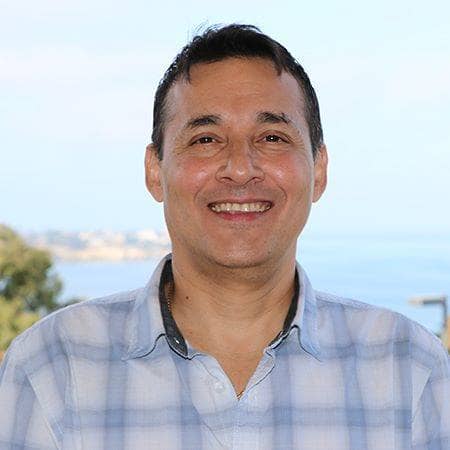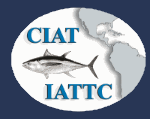Ecosystem & Bycatch Program
The Ecosystem and Bycatch Program provides scientific support for implementing the broad goals of the Antigua Convention, in particular for the IATTC to “adopt, as necessary, conservation and management measures and recommendations for species belonging to the same ecosystem and that are affected by fishing for, or dependent on or associated with, the fish stocks covered by the Convention”. Two main duties are assigned to the program:
- To assess and mitigate the ecological impacts of the tuna fisheries on species and habitats. This includes the following activities:
- Develop analytical tools to identify and prioritize species at risk for data collection, research and management.
- Conduct Ecological Risk Assessments (ERAs) of EPO fisheries to identify and prioritize species at risk.
- Conduct spatiotemporal analyses to identify areas of high bycatch/catch ratios for potential use in spatial management (static or dynamic closures), and investigate alternative tools for bycatch mitigation.
- In collaboration with the fishing industry, conduct scientific experiments to:
- identify gear technology that will reduce bycatches and mortality of prioritized species;
- develop best practices for the release of prioritized bycatch species;
- develop best practices for mitigating the impacts of fishing on habitats in the EPO.
- Conducting workshops for vessel crews to promote the reduction of impacts of the fishery on non-target species and compliance with IATTC resolutions.
- In coordination with the Stock Assessment Program, improve our understanding of the effects of the operational characteristics of the fishery on fishing mortality, stock assessment, and management advice.
- Support for capacity-building with regard to bycatch mitigation, and development of data collection programs for artisanal fisheries of coastal States (e.g. shark fisheries).
- To improve our understanding of the EPO ecosystem as well as the interactions among the environment, climate and fisheries:
- Conduct trophodynamic studies for defining key assumptions in EPO ecosystem models. This includes sampling and analysis of diets and tissues required to understand food-web dynamics, and analysis of biological, ecological and fisheries data to facilitate ecological risk assessment and ecosystem modeling.
- Ecosystem modeling studies. This includes improving analytical tools to evaluate anthropogenic and climate impacts of the EPO ecosystem.
- Conduct spatiotemporal analyses to better understand the effect of key environmental drivers on the short-term as well as long-term (regime shift) fluctuations of abundance of tunas and prioritized bycatch species.
Organigram
Staff







Projects
Bibliography
- Ovando, Daniel 2025. Predicted Effects of Marine Protected Areas on Conservation and Catches Are Sensitive to Model Structure.. Theoretical Ecology
- Logan, J.; Butler, C.; Fuller, L.; Staudinger, M.; Hoffmayer, E.; Hanisko, D.; Varela, J.; Medina, A.; de la Serna, J.; Godoy, D.; Macías, D.; Golet, W.; Chase, B.; MacKenzie, B.; Olafsdottir, D.; Nadeau, S.; Rodríguez-Marín, E.; Ciavaglia, E.; Tinti, F.; Battaglia, P.; Romeo, T.; Andaloro, F.; Sino 2025. Characterizing the diet of Atlantic bluefin tuna Thunnus thynnus across its spatial range: a metadata analysis spanning over three decades. Inter-Research Science Publisher
- Tyler C Loughran, Jennifer L Cudney, Daniel P Crear, Lisa M Crawford, Becky J Curtis, Elsa M Gutierrez, Eric R Hoffmayer, Camilla T McCandless, Eric S Orbesen, Bryan A Keller, David W Kerstetter, Derke JG Snodgrass, Wendy E Morrison, John A Quinlan, Roger B Griffis, Peter W Cooper 2025. A climate vulnerability assessment for US highly migratory fishes in the Atlantic Ocean. PLOS Climate
- Melissa A Karp, Megan Cimino, J Kevin Craig, Daniel P Crear, Christopher Haak, Elliott L Hazen, Isaac Kaplan, Donald R Kobayashi, Hassan Moustahfid, Barbara Muhling, Malin L Pinsky, Laurel A Smith, James T Thorson, Phoebe A Woodworth-Jefcoats 2025. Applications of species distribution modeling and future needs to support marine resource management. ICES Journal of Marine Science
- Talwar, B. S., B. X. Semmens, A. Aires-da-Silva, S. Griffiths, J. Humberstone, M. Hutchinson, J. Lopez, C. Minte-Vera, D. Ovando, M. Román-Verdesoto, S. Siu and L. F. Bellquist 2025. Informing the spatial management of Silky Shark (Carcharhinus falciformis) in the Eastern Pacific Ocean. Reviews in Fish Biology and Fisheries
- Scutt Phillips, J., L. Escalle, H. Murua, J. Lopez and G. Moreno 2025. "A short-lived FAD in the Pacific: Implications and adaptations in the move to biodegradable fish aggregating devices.". Marine Pollution Bulletin 218: 118130
- Cronin, M. R., J. Murua, D. A. Croll, M. Hutchinson, N. Lezama-Ochoa, J. Lopez, H. Murua, M. D. Palacios, V. Restrepo, J. D. Stewart, Y. Swimmer, K. M. Zilliacus and G. Moreno 2025. Evidence for a fisher-designed solution to manta and devil ray bycatch in tuna fisheries. Conservation Biology
- Griffiths S., Wallace, B.P., Lopez, J., Cáceres, V., Rodríguez, L.H., Abrego, M., Alfaro-Shigueto, J., Andraka, S., Brito, M.J., Bustos, L.C., Cari, I,. Carvajal, J.M., Clavijo, L., Cocas, L., Paz, N.D., Herrera, Lauritsen, A.M., M., Mangel, J.C., Pérez-Huaripata, M., Piedra R., Quiñones Dávila, J.D 2024. Vulnerability of the Critically Endangered leatherback turtle to fisheries bycatch in the eastern Pacific Ocean. II. Assessment of mitigation measures. Endangered Species Research
- Lopez, J., Griffiths S., Wallace, B.P., Cáceres, V., Rodríguez, L.H., Abrego, M., Alfaro-Shigueto, J., Andraka, S., Brito, M.J., Bustos, L.C., Cari, I,. Carvajal, J.M., Clavijo, L., Cocas, L., Paz, N.D., Herrera, M., Mangel, J.C., Pérez-Huaripata, M., Piedra R., Quiñones Dávila, J.D., Rendón, L., Rg 2024. Vulnerability of the Critically Endangered leatherback turtle to fisheries bycatch in the eastern Pacific Ocean. I. A machine-learning species distribution model. Endangered Species Research
- Griffiths, S. P., B. Wallace, V. Cáceres, L. H. Rodríguez, J. Lopez, M. Abrego, J. Alfaro-Shigueto, S. Andraka, M. J. Brito, L. C. Bustos, I. Cari, J. M. Carvajal, L. Clavijo, L. Cocas, N. de Paz, M. Herrera, A. M. Lauritsen, J. C. Mangel, M. Pérez-Huaripata, R. Piedra, J. A. Quiñones Dávila, L. Ren 2024. Vulnerability status and efficacy of potential conservation measures to reduce tuna fishery bycatch of the Critically Endangered East Pacific leatherback turtle Dermochelys coriacea. Endangered Species Research

